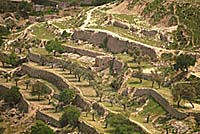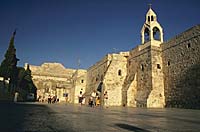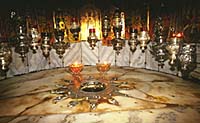What and where is…
Bethlehem
also known as: Beth-lehem, Bet Lehem, Bat Lechem, Beit-Lahm
Hebrew: בֵּית לֶחֶם —transliteration: Bet Lehem or Bethlehem
Ancient Greek: Βηθλεέμ
This is the name of 2 biblical cities.
-
Bethlehem of the Tribe of Judah
also known as: Bethlehemjudah, Bethlehem-Judah, Bethlehem of Juda, Bethlehem of Judea, Bethlehem-Ephratah, Ephratah, Ephrath, a City of David
Situated in the hill country, it was originally called Ephratah/Ephrath, meaning “fruitful” (Genesis 35:16, 19; 48:7; Ruth 4:11), and its citizens were called Ephrathites.
It was also called Bethlehem-Ephratah (Micah 5:2), Beth-lehem-judah (1 Samuel 17:12), and “the city of David” (Luke 2:4).
 Shepherds’ fields outside modern Bethlehem
Shepherds’ fields outside modern BethlehemFirst mention in Scripture
This place is first mentioned in Scripture as the place where Jacob/Israel’s dear wife Rachel died and was buried “by the wayside,” directly to the north of the city (Genesis 48:7).
Notable residents include:
- Caleb and his wife Ephrath (when the town was called Caleb Ephrathah, 1 Chronicles 2:24, and later just Ephrath)
- Salmon, the founder
- Boaz
- Obed
- Jesse
- Ruth
- Naomi
- David
Ruth and Naomi
The valley to the east was the scene of the story of Ruth the Moabitess. In these fields, she gleaned with Naomi, and returned on a path to the town.
Birthplace of King David
This Bethlehem was David’s birthplace, and here he grew into a young man. David was anointed here as Israel’s 2nd king by the prophet Samuel (1 Samuel 16:4-13).
It was from a well in this Bethlehem that 3 of David’s heroes brought water for him at the risk of their lives when he took refuge in the cave of Adullam (2 Samuel 23:13-17).
Birthplace of Jesus Christ
Bethlehem is distinguished above every other city as the birthplace of “Him whose goings forth have been of old.”
“And you, Bethlehem, land of Judah,
Are by no means least among the leaders of Judah;
For out of you shall come forth a Ruler
Who will shepherd My people Israel.” —Matthew 2:6 NASB, Micah 5:2In the time of our Lord, a census was made by the Roman government (Luke 2:1). For this reason, Mary and Joseph traveled from nearby Nazareth to Bethlehem of Judah where Jesus the Messiah—God incarnate—was born.
Q & A- Was Jesus born in a stable? a cave? a barn?
- What are some of the most common misconceptions about Jesus Christ’s birth?
- When did the Luke 2 census occur? Is there a biblical error?
- See our special site section on the birth of Jesus
Bethlehem’s children slaughtered
Afterward, “when Herod saw that he had been tricked by the magi,” he his men and slew “all the male children who were in Bethlehem, and all its vicinity, from two years old and under” (Matthew 2:16, 18; Jeremiah 31:15).
Modern Bethlehem
 Modern Bethlehem’s Manger Square and Church of the Nativity
Modern Bethlehem’s Manger Square and Church of the Nativity The Shrine of the Nativity which is claimed to mark the place of Jesus Christ’s birth in Bethlehem
The Shrine of the Nativity which is claimed to mark the place of Jesus Christ’s birth in BethlehemBethlehem still bears its name today. It is also known as Beit-Lahm, i.e., “house of flesh.” It is about 5 miles south of Jerusalem, standing at an elevation of about 2,550 feet above the sea, thus 100 feet higher than Jerusalem.
Constantine the Great (330 AD) built a memorial church here which still exists, called the “Church of the Nativity,” located over a grotto or cave called the “holy crypt,” and said to be the “stable” in which Jesus was born. This is perhaps the oldest surviving Christian church in the world.
Close to it is another grotto, where Jerome, the Latin early church father, is said to have spent 30 years of his life in translating the Scriptures into Latin. (See Versions of the Bible)
Rachel’s supposed tomb is also marked in the modern city of Bethlehem. It is revered by Jews, Christians, and Muslims as the wife of Jacob and mother of Joseph and Benjamin.
The modern city has many hotels and small shops on narrow, winding streets. The city is built on a hill, and many houses are built in front of old caves.
Bethlehem, the city of David and birthplace of Christ, now a Palestinian town with a Muslim majority—satellite view • scroll north to see Jerusalem, 6.2 miles (10 km) away
Q & A- What is Ephratah (Ephrath)?
- What are Ephrathites?
- Who is Rachel?
- Who is Ruth, resident of Bethlehem?
- Who is Naomi, resident of Bethlehem?
- Who is Jesse, resident of Bethlehem?
- Who is David, resident of Bethlehem? and why is he very important?
- The birth of Christ, in Bethlehem
- Who is Joseph, the adoptive-father of Jesus Christ?
- Who is Mary, the mother of Jesus the Christ? What does the Bible say about her?
- Jesus
- What and who is Christ?
- What and who is The Messiah?
- How do we know that Jesus is the Messiah?
- List of Messianic Prophecies fulfilled by Jesus Christ
- What and who is a shepherd?
- About sheep in the Bible
- Answers about agriculture in the Bible
-
Bethlehem of the Tribe of Zebulun
also known as: Bethlehem of Zebulun, Bethlehem of Galilee, the Galilean Bethlehem, and Beth Lehem Zoria
This Bethlehem is mentioned in Joshua 19:15…
Territory of Zebulun
Now the third lot came up for the sons of Zebulun according to their families. And the territory of their inheritance was as far as Sarid.Then their border went up to the west and to Maralah, it then touched Dabbesheth and reached to the brook that is before Jokneam. Then it turned from Sarid to the east toward the sunrise as far as the border of Chisloth-tabor, and it proceeded to Daberath and up to Japhia.
From there it continued eastward toward the sunrise to Gath-hepher, to Eth-kazin, and it proceeded to Rimmon which stretches to Neah.
The border circled around it on the north to Hannathon, and it ended at the valley of Iphtahel. Included also were Kattah and Nahalal and Shimron and Idalah and Bethlehem; twelve cities with their villages.
This was the inheritance of the sons of Zebulun according to their families, these cities with their villages. —Joshua 19:10-16 NASB
The 10th ruler/judge of Israel named Ibzan came from this Bethlehem and later died there with his large family.
It is also known as “Bethlehem of Zebulun,” “Bethlehem of Galilee,” “the Galilean Bethlehem,” and “Beth Lehem Zoria.” It eventually became a Christian community, and much later became a ruined village called Beit-Lahm. It is located about 6 miles (10 kilometers) northwest of Nazareth and is now an Israeli moshav, a community for cooperative agriculture.
Modern Bethlehem of Galilee, Israel—satellite view / Zoom out to view its proximity to Nazareth—6 miles southeast
Q & A